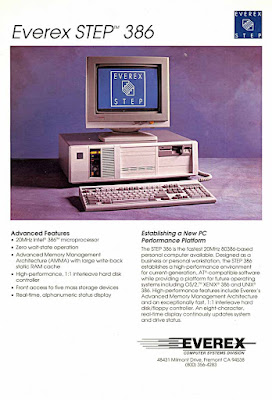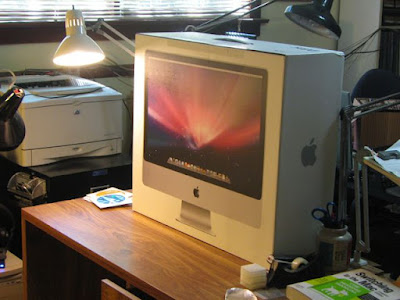(Click on the picture to read about all the advanced features.)
In my notes I listed the cost of its various components:
25 Mhz. 4 Mbyte. Computer $4000.00
80 Megabyte Hard Drive $ 850.00
1.44M Floppy $ 110.00
NEC 13" Montor $ 667.00
VGA Graphics Card $ 350.00
Serial Interface $ 100.00
Math Co-Processor $ 600.00
6.5% Sales Tax $ 434.00
----------
Total $7111.00
According to this site, $7,111.00 in 1989 is equivalent to $12,699.00 today. My entire system (including software and an Apple Postscript printer) cost about $13K back then. Money well spent.
Over two decades I owned a succession of ever faster, ever cheaper PC computers. During those years I developed a deep antipathy for all Microsoft products. This was especially true of their operating systems. But I was stuck with those because my principal work program, Score, still runs under DOS.
My hatred for Bill Gates' products grew extreme and I wanted a way to vote against Microsoft with my future purchases. Rest assured that I am leaving a number of lengthy anti-Microsoft rants out of this post. My obvious choice, of course, was to switch to Apple.
I can pinpoint the moment at which my mind was made up. In 2008, PC Magazine, which I had been reading since before I purchased the Everex, ran an article called OS Wars, The Battle for Your Desktop. It declared Apple OSX the winner (computer magazines like to declare winners). The article suggested the best OS for different professions, including:
ARTIST/MUSICIANYou think I would have figured that out for myself - all my clients and most of my friends use Macs. When the PC magazines are telling me to get a Mac, even I got the message.
Mac OS. The other artsy people will laugh at you if you use anything else.
So, last fall, I ordered a 24" iMac for $2,059.00 - or one sixth the price the Everex would have cost today. The Mac is 120 times faster than the Everex and has 1000 times the RAM and 12,500 times the hard disk space.
It arrived exactly one year ago today, September 24. Here's what it looked like. (I did take it out of the box just after snapping this picture. Notice the completely useless book Switching to the Mac on the desk next to the box.)
Suddenly faced with doing daily tasks, I discovered the real meaning of switching from PC to Mac. Yes, those clever television ads ("I'm a PC" "I'm a Mac") would have you believe that switching is SO simple. Possibly true, I suppose, for a more casual user. But I've had two decades to form my computer-using ways - by which I mean that many of my work habits are set in stone. Every old familiar task became a new adventure.
Would it be so hard to throw a bone to possible Windows-to-Mac converts with a few Windows-mode options? Suddenly having to do things the Macintosh OSX way was very frustrating. For the first few months I swore at my new computer just as much as I had ever railed at any of my Windows computers. And I bitched to any Mac user who'd listen. Most of them wouldn't. "Mac users are like pre-verbal infants." I'd say. "If they want something, they point at it." There were plenty of times I regretted my purchase.
Here's a couple examples:
- Every program, Mac and PC, has a menu bar: File, Edit, View etc. On PC there is easy access to these commands from the keyboard - Alt-F opens the File menu, then every sub-menu has a letter highlighted to show how to invoke it. I used these extensively on PC. Mac has a similar but completely irrational function. You're supposed to be able to customize the behavior (although I can't get that to work.)
- On PC, if a Window is not in front but you can still see it, if you click on a visible command it is invoked. On Mac you must click twice - first to bring the window forward, then again to invoke the command. Curiously, Apple's own software iTunes works like a PC in this regard.
- Switching windows using Alt-Tab on a PC is straight forward. If you tab to the running program you want, it appears. On OSX, after 1 full year of trying to suss the rationale behind Command-Tab, I can not predict whether or not a window will open when I switch to it.
- Apple keyboards are crap. The computer came with a free-standing laptop keyboard. I replaced this with a mushy, plastic, older Apple keyboard which I hate less than the first one but at least it has all the keys. The writing on the wall in Apple land is that keyboards are old fashioned. All those iPads, iPods, iPhones and MagicMice make it clear that in the future if you want something you should just point at it.
And, yes, there are good things about switching:
- Music programs - especially Sibelius and the various plug-ins I use with it - run like a dream in comparison to Windows.
- OSX really is more stable. It ran for over 60 days without rebooting once. It might still be going except that Leslie pulled the power cord out with her foot.
- I love the beautiful screen and graphics - although sometimes it takes a bit of negotiating with Leslie to decide who gets to use the iMac first.
- Microsoft Windows runs directly on the iMac using a translator program. This means I didn't have to purchase an expensive new copy of Photoshop and I can keep using certain geeky Windows only programs on the Mac. I'm still using all three of the computers I had before albeit for fewer, more specific tasks. I now have even more Windows computers than I used to (if you count the Mac as one). In my experience computers don't get replaced, they multiply.
And someday, maybe, when I go back and forth between Windows and Mac I'll be able to remember when the close and minimize buttons are on the left (OSX) and when they're on the right (Windows). That will be a great day.
Pre-Verbal Tags: iMac. . . OSX. . . Windows. . . Apple. . . Microsoft. . . Everex










